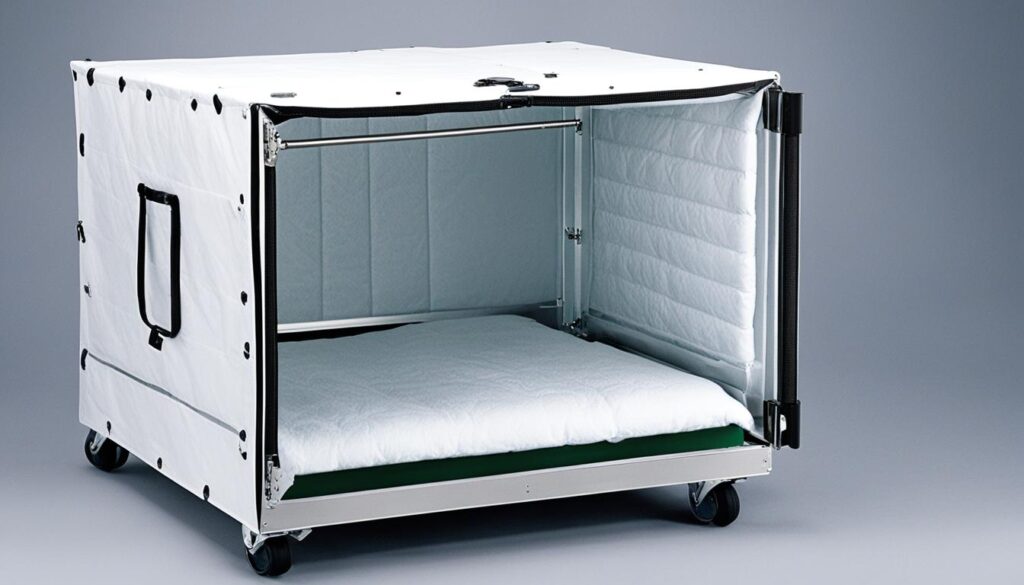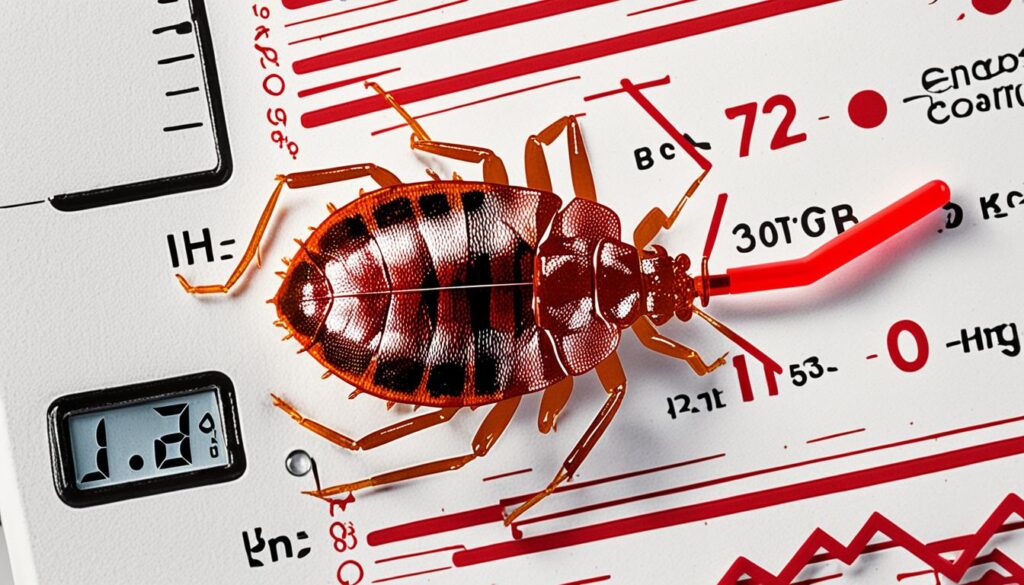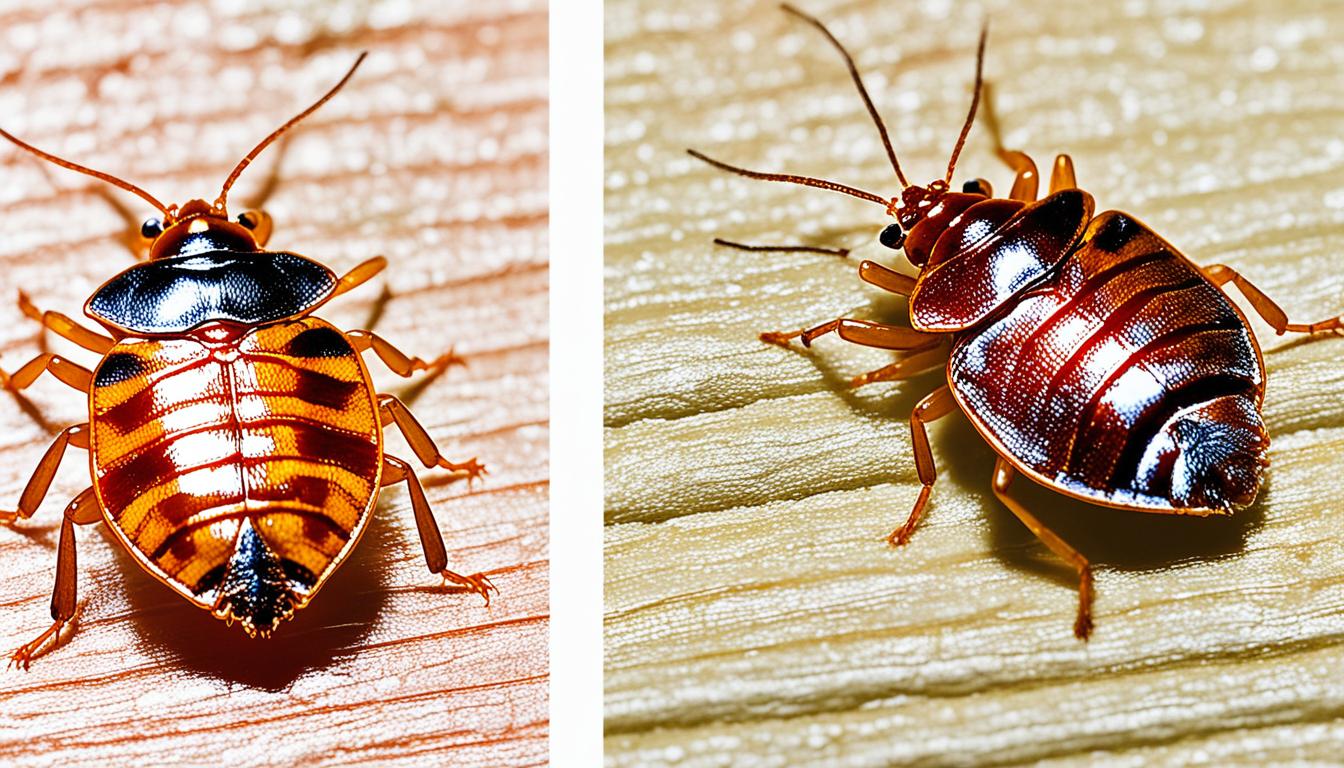Do you know the perfect temperatures to kill bed bugs and their eggs? These bugs are hard to get rid of. But, knowing the right heat levels can lead to a successful removal. This guide will dive into using heat to kill bed bugs at any life stage.
Key Takeaways
- Bed bug adults are killed at temperatures between 45°C/113°F and 54.8°C/130.6°F
- Bed bug eggs require higher temperatures, ranging from 45°C/113°F to 48.3°C/119°F, to achieve complete mortality
- Exposure times for lethal temperatures can vary from 15 minutes to several hours, depending on the life stage and exact temperature
- Proper heat treatment methods, such as using a clothes dryer or steam cleaning, can effectively eliminate bed bugs and their eggs
- Whole-room heat treatments by professionals are a reliable option for severe infestations, though they can be costly
Understanding the Bed Bug Menace
Bed bugs and humans have been close since ancient times. They are found nearly everywhere today, especially in North America. Over time, bed bugs have become more resistant to insecticides. This makes controlling them a serious challenge.
The Resurgence of Bed Bug Infestations
Due to reduced insecticide use, bed bugs are harder to get rid of. Some parts of homes and apartments are difficult to treat with insecticides. Bed bugs can multiply quickly and live a long time, which adds to the challenge of controlling them.
Challenges in Controlling Bed Bugs
A single bed bug can lay many eggs in her life. Most of these eggs, about 97%, will hatch if conditions are good. With so many eggs, bed bug populations can grow very rapidly. This rapid growth complicates efforts to control them.
Heat as an Effective Bed Bug Treatment
Heat treatment is a top choice for fighting bed bugs. It uses high temperatures to kill them and their eggs. This method is now widely used, thanks to new commercial heat equipment.
There are different heat treatment methods. These include using special boxes or trailers and treating entire rooms. Using heat is great because it’s effective right away, lets you treat many kinds of items, and cuts down on insecticide use.
Research shows heat works very well against bed bugs. It takes longer to kill their eggs with heat than the bugs themselves. But, raising the temperature by just 6 degrees can make a big difference in how quickly they die.
But, heat might not reach every part of a room equally. Some areas could stay cooler, like under baseboards. So, professionals use extra fans to move the hot air around. This makes sure more bugs and eggs everywhere get heated to the right temperature.
| Temperature | Minimum Treatment Time |
|---|---|
| 120°F (48°C) | 8 hours |
| 125°F (52°C) | 6 hours |
| 130°F (54°C) | 4 hours |
| 135°F (57°C) | 3 hours |
| 140°F (60°C) | 2 hours |
In very cold places or where bed bugs are a big problem, it might take longer to treat. By knowing how to use heat well, professionals can remove bed bugs completely. They use the right tools and methods to target the bugs specifically.
Lethal Temperatures for Bed Bug Elimination
Getting rid of bed bugs often means using heat. Studies show that these bugs, from egg to adult, can die at high temperatures. This method offers a sure way to eliminate bed bugs.
Lethal Temperature for Adult Bed Bugs
For adult bed bugs, a heat of 48.3°C (118.9°F) is deadly. Exposing them to 45°C (113°F) for 94.8 minutes kills 99% of them. This research proves heat can work very well.
Lethal Temperature for Bed Bug Eggs
It’s harder to kill bed bug eggs. They need a hotter 54.8°C (130.6°F) to die. Even at 45°C (113°F), they can last 7 hours. But at 48°C (118.4°F) for 71.5 minutes, they don’t make it.
These studies highlight the need for high heat to kill bed bugs. Longer heating times at lower temperatures can still work. But 140°F is safe to say they’re all gone.
For complete elimination, heat treatments need precise planning. You must consider exact temperatures and time needed for each stage. Knowing this, both pros and anyone at home can get better at wiping out bed bugs.
Using Heat to Kill Bed Bugs: Methods and Techniques
Clothes Dryers and Portable Heat Chambers
Getting rid of bed bugs can be tough. But, heat is a great way to do it. You can start by using your clothes dryer at home. Just set it to the highest heat for 30 minutes. This will kill bed bugs of all ages, including the eggs. It’s perfect for items like clothes, sheets, and even some shoes and bags.
But what about things that can’t go in the dryer? For those, you can use portable heat chambers like the PackTite®. These little machines can heat up things like bags, sleeping bags, and pillows. They reach temperatures that are sure to get rid of the bed bugs.
Steam Treatment for Targeted Areas
Professional pest fighters use steam to kill bed bugs too. They have steamers made just for this job. These steamers can get the bugs hiding in mattresses, box springs, furniture, and along the floor. The hot steam kills the bugs and eggs right away.
Heat is a great option because it’s not toxic. Methods like using dryers, heat chambers, and steam cleaning are safe even in places where people live. They offer a safe and powerful way to remove bed bugs without using chemicals.

Whole-Room Heat Treatments
There are new methods to fight bed bugs. Now, rooms can be heated to kill these pests completely. Systems like ThermaPureHeat® and Temp-Air Heat Remediation System® do this. They blow hot air into the room, reaching everywhere, including small spots. The temperature goes up to about 135°F, using heaters that run on electricity or propane. This is known as whole-room heat treatment.
One big plus of these treatments is you don’t need to take everything out or pack it all up. They can get rid of the bugs in one go. The heating doesn’t stop until all the sensors show 113°F, which is when the bugs and their eggs are killed.
ThermaPureHeat® and Temp-Air Heat Remediation System®
The ThermaPureHeat® and Temp-Air Heat Remediation System® are top choices for dealing with bed bugs. They are designed to heat rooms or even entire houses very efficiently. This heat is deadly for bed bugs and their eggs.
There are many good things about these heat treatments:
- No need for residents to remove or bag their belongings
- Ability to cure infestations in a single treatment
- Reaching the bed bug thermal death point of 113°F in all areas
- Maintaining the lethal temperature for at least 60 minutes to ensure complete eradication
- Remote monitoring of temperatures in hard-to-reach cracks and crevices
These new heat systems are a top pick for getting rid of bed bugs. They work well without using any harmful chemicals. This way, they’re good for our health and get the job done right.
What Temperature Kills Bed Bugs and Their Eggs
Temperature is key in fighting bed bugs effectively. Scientists found the exact temperatures needed to kill both adult bed bugs and their eggs.
Adult bed bugs die with 99% certainty at 118.9°F. But, to make sure none survive, it’s best to use even hotter temps. A temperature of 140°F or more instantly kills them.
When it comes to bed bug eggs, even higher heat is required. Eggs last only 71.5 minutes at 118.4°F. They all die at 130.6°F or hotter.
To really understand these results, note that adult bed bugs need 94.8 minutes at 113°F for 99% to die. Meanwhile, eggs die faster, lasting only 71.5 minutes at 118.4°F. This shows how critical it is to keep the right high temperature for long enough to wipe out all bed bugs and their eggs.
If bed bugs are your problem, or their eggs, knowing these temperatures is vital. With this info, you can effectively get rid of bed bugs and stop them from coming back.
Freezing Bed Bugs: An Alternative Approach
Heat treatments are commonly used to get rid of bed bugs. But, freezing works well too. Exposure to 0°F or lower kills bed bugs at all life stages, from eggs to adults.
Research shows that freezing at 0°F for 2 hours kills all bed bugs. It might take 8 hours to freeze a big batch of clothes. For complete removal, leave the items in the freezer for 10-12 hours.
Bed bugs start to die off at temperatures below 0°F (-18°C). The extreme cold stops them from eating blood, breeding, and makes their cells freeze. This process can also make them enter a stage where they hardly use any energy.
Freezing may not work for big infestations that cover an entire house. In such cases, using heat is better. But, adding freezing to other strategies like cleaning and insecticides can boost success.
| Temperature Range | Exposure Time | Bed Bug Mortality |
|---|---|---|
| 0°F (-18°C) or below | At least 10-12 hours | 100% mortality of all life stages |
| -20°F (-29°C) to -30°F (-34°C) | At least 4 days | Complete eradication of bed bugs |
To kill bed bugs by freezing, items must be colder than 0°F (-18°C) for 4 days. This time and temperature make sure all bed bugs and eggs are killed.
Freezing works when not all your house is infested. It’s best combined with other methods. Knowing the right cold and time needed can help clear bed bugs and make your home safe again.
Combining Heat Treatment with Other Control Measures
Using heat treatment by itself works well to get rid of bed bugs. However, you might want to mix it with other methods for better effect. If a building keeps heat, known as a heat sink, adding insecticides in cool areas can stop bed bugs from escaping.
Heat treatment can’t stop bed bugs from coming back. That’s why it’s smart to use other methods like keeping an eye out, staying clean, and checking up later. These steps can stop them from returning.
Putting together heat treatment with other bed bug control methods makes fighting these bugs more powerful. Let’s see why this combo is so good:
- Increased elimination of bed bugs: Heat can’t get every bug. Using chemicals or just removing them helps get rid of more.
- Residual protection: Just heat isn’t enough to keep bugs away forever. You need to watch and check regularly to avoid them coming back.
- Addressing heat-resistant populations: Some bugs can stand high heat. Mix in cold treatments or natural sprays to beat them.
Putting heat treatment together with other methods makes a complete plan to remove bed bugs for good. This teamwork gives quick results and keeps your place bug-free for a long time.

Pros and Cons of Heat Treatment
Heat treatment is great for getting rid of bed bugs. It’s safe and has a lot of plus points. But it also has a few downsides. Let’s chat about using heat to fight off bed bugs.
Advantages of Heat Treatment
Heat treatment kills bed bugs at every life stage, even their eggs. This happens when temperatures reach 120 degrees Fahrenheit or more. It wipes out the whole bug population, not letting any survive to come back.
It works fast too. A single session can clear your home of bed bugs in a few hours. This is a big win for people and businesses.
There’s no need to pack up your stuff before treatment. This is a lot less work and means you can stay at home. Pretty convenient, right?
Disadvantages of Heat Treatment
Heat treatment might be costly. Special tools and know-how are needed to do it right. So, it can be pricier than some other methods.
However, it doesn’t keep bed bugs away for long. They can come back after treatment. So, it’s not a perfect fix for the future.
Also, too much heat or time can harm your stuff. Looking after the process is key to avoid this. It’s all about careful control.
Heat treatment is a strong weapon against bed bugs. But, it works best when mixed with other controls. Talking with an expert will guide you to the best plan for your situation.
Conclusion
Bed bugs are making a strong comeback. But, the use of heat treatment is shining as a top solution. By knowing the right heat levels, both adult bugs and their eggs can be entirely wiped out.
Methods like using dryers, special heat chambers, steam, and whole-room heating work well. These techniques hit temps from 120°F to 140°F, killing bugs and their eggs quickly. Heat treatment is a surefire way to tackle bed bug problems.
Heat treatment has many pluses, but it works best when combined with other strategies. Keep up with new bed bug control methods, like heat treatment, freezing, and using chemicals. Doing this helps prevent future bed bug invasions, keeping your space bug-free.
